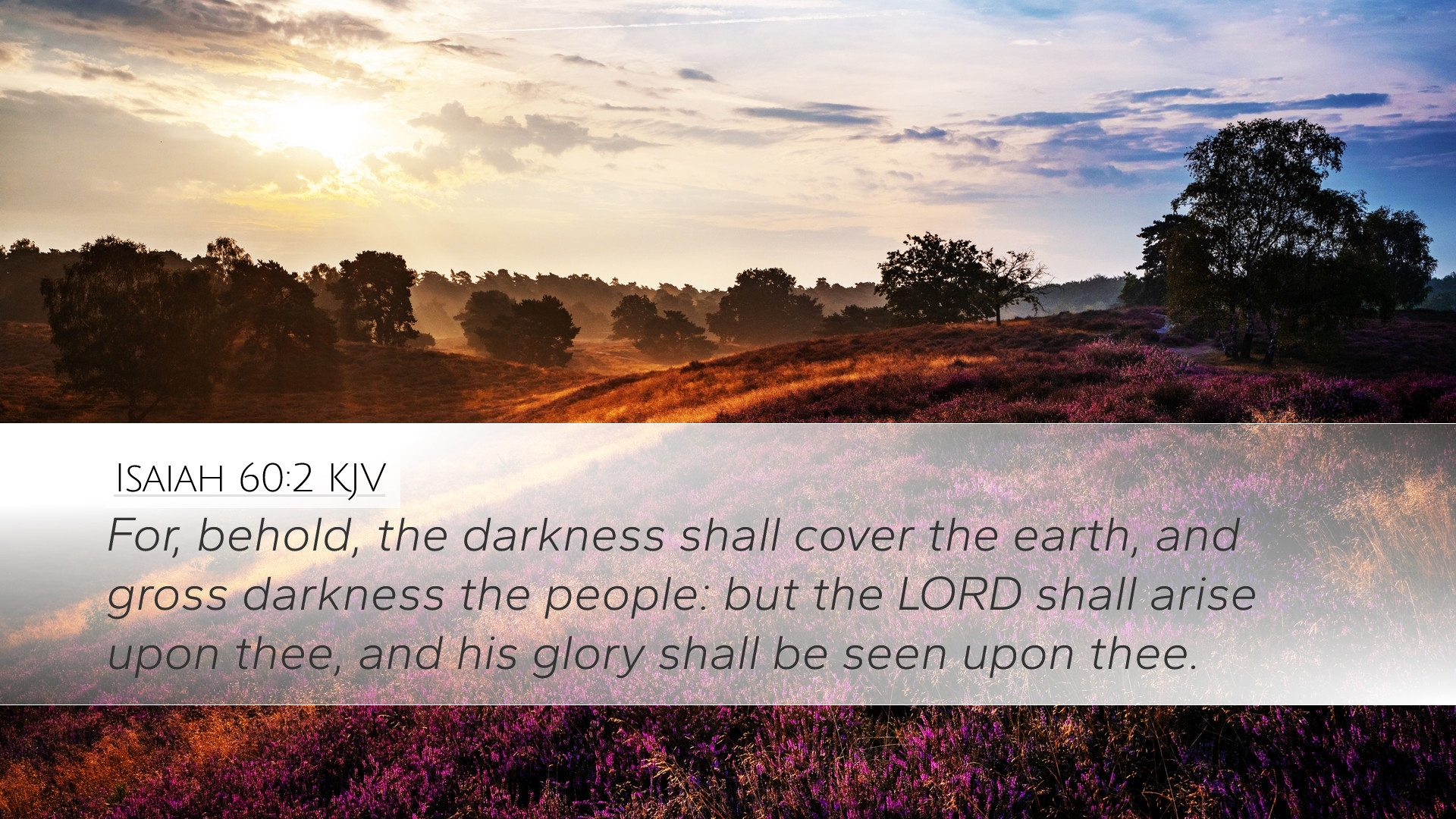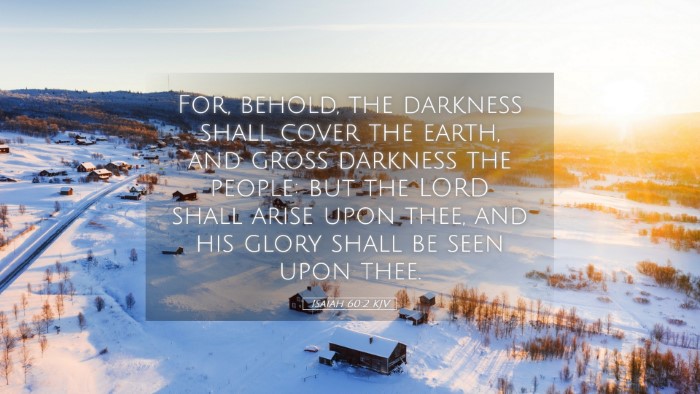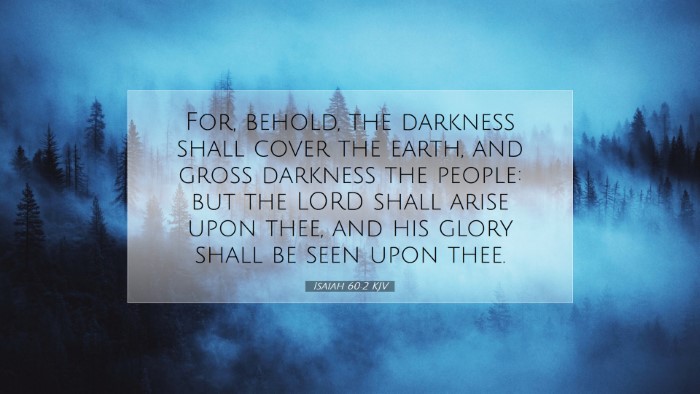Commentary on Isaiah 60:2
Verse Overview: Isaiah 60:2 states, "For behold, the darkness shall cover the earth, and thick darkness the peoples; but the LORD will arise upon you, and his glory will be seen upon you." This verse captures a profound contrast between darkness and light, serving as a pivotal point in the larger context of hope and restoration promised to God's people.
Contextual Background
In Isaiah 60, the prophet paints a vivid picture of future glory for Zion. This chapter emerges amid themes of restoration and divine light, contrasting starkly with the previous circumstances of despair faced by Israel. The mention of darkness suggests not just physical darkness but a spiritual or moral barrenness afflicting nations. Here, Isaiah introduces a theme that eventually captures the heart of the gospel narrative - the coming of light amidst darkness.
Commentary Insights
-
Matthew Henry's Commentary
Henry emphasizes the severe contrast between the prevailing darkness of the world and the divine illumination that the Lord brings. He notes that the darkness could symbolize ignorance, sin, and despair prevalent among nations and individuals. This darkness may be reflective of judgment, a key element in Isaiah's prophetic messages, yet it does not mark the end; rather, it sets the stage for the Lord's intervention.
Henry highlights the transformative power of God's light, stating that it does not merely illuminate but also brings hope, guidance, and decorates the lives of believers with His glory. This glory, as Henry notes, is visible not merely in a metaphorical sense but should also guide the behavior and spiritual status of those who claim to follow the Lord.
-
Albert Barnes' Notes
Barnes provides a detailed examination of the words used in this verse, particularly focusing on 'darkness' and 'glory'. He explains that 'darkness' can be interpreted as both literal and figurative, encompassing all forms of evil, ignorance, and despair that cover humanity. Furthermore, the expression that the 'LORD will arise' signifies a divine act of deliverance, a theme present throughout the book of Isaiah.
Barnes identifies the glory that will be seen upon the people as representative of God's presence, which offers assurance to believers. He elaborates that the anticipation of this glorious appearance should encourage the faithful, emphasizing a call to evangelistic action, prompting believers to shine in their respective communities as reflections of God's glory.
-
Adam Clarke's Commentary
Clarke takes a nuanced approach, elucidating the duality of darkness and light found in this passage. He discusses how 'darkness' could refer to the trials and tribulations faced by Israel during their exile, while ‘the LORD’ represents a divine presence that supersedes human despair. Clarke connects the fulfillment of this prophecy with the arrival of Christ, who embodies the ultimate light to the world.
His commentary further specifies that the 'glory' mentioned is not superficial; it encompasses attributes such as righteousness, holiness, and redemption. Clarke's analysis also underscores the necessity for Israel to be a beacon of hope, demonstrating that the transformed state of believers should provoke the nations to seek the true God.
Theological Implications
The profound theological implications of Isaiah 60:2 are extensive, intersecting themes of light and darkness, divine intervention, and the hope of salvation. The text invokes reflection on the nature of divine glory and its manifestation in the world. It encourages believers to live in stark contrast to the prevailing darkness, showcasing the transformative power of God’s presence in their lives.
Moreover, it serves as a prophetic reminder of the coming of Christ, who is often referred to as the Light of the World (John 8:12). This anticipation not only underscores the messianic prophecies of the Old Testament but also invites a response from New Testament believers, to be active participants in spreading the light of Christ to a darkened world.
Practical Application
For pastors, theologians, and students of the Bible, Isaiah 60:2 offers significant lessons in practical application:
- Encouragement in Times of Darkness: The assurance of God’s light should bolster the faith of believers who may be experiencing personal or communal darkness.
- Call to Action: Believers are encouraged to embody the light of Christ in their daily lives, actively seeking to dispel darkness in their spheres of influence.
- Community and Evangelism: This passage inspires the church to become a community that reflects God's glory amidst moral and spiritual challenges of the world.
- Hope in God’s Promises: Just as the prophecy assures restoration for Israel, it serves as a reminder of God’s ongoing faithfulness and the hope of redemption for all believers.
- On Global Scale: The text reminds the church to have a heart for the nations, urging outreach and mission as essential components of the Christian faith.
Conclusion
Isaiah 60:2 resonates powerfully across the ages, with rich meaning for believers entrenched in a world often shrouded in darkness. The insights from public domain commentaries enrich our understanding of this verse, revealing the luminous hope found in the glory of the Lord. Whether one approaches this text from a historical, theological, or practical standpoint, it serves as a profound reminder of God’s redemptive plan and the call to live as lights in a world longing for illumination.


